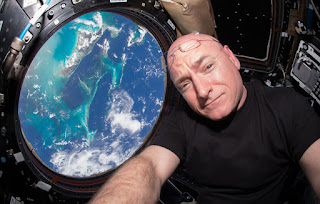U.S. Navy captain and astronaut Mark Kelly wrote this on his Facebook page last week.
 |
| American Astronaut Scott Kelly set records in space in 2015 and 2016. |
Kelly's twin brother Capt. Scott Kelly returned to Earth after 340 days and 400 investigations into how the body and mind adapt to being in space. Back on terra firma Mark served as a control for the experiments.
According to NASA, the studies will "advance NASA’s mission to reach new heights, reveal the unknown, and benefit all of humanity," to include an eventual journey to Mars.
Shortly after returning, Scott was optimistic about how humans could adapt to super-extended deployments in space.
"A year's a long time. I felt like I'd been up there my whole life after six months," Capt. Scott Kelly said. "I'm definitely encouraged on our ability to go even longer. Even though I looked forward to coming home, and there were things I missed, if it's for the right reason I clearly could have stayed for even longer ... however long it took."
Immediately after brother Scott's safe return Capt. Mark Kelly spoke on National Public Radio about the effects of radiation in space and theories of aging. Mark took part in his brother's journey, undergoing a twins study to evaluate and compare how the body changes.
 Both brothers share a lifelong commitment to science, technology, engineering, mathematics, adventure and education.
Both brothers share a lifelong commitment to science, technology, engineering, mathematics, adventure and education.Capt. Mark Kelly is reaching new generations of readers with his children's books, including "Mousetronaut," "Mousetronaut Goes to Mars" and his latest, with Martha Freeman, "Astrotwins: Project Blastoff."
"Astrotwins" (Simon & Schuster, 2016), published this month, is about middle schoolers getting ready to take off and is based on the childhoods of the Kelly brothers.
The Kellys were born on Orange, New Jersey on Feb. 21, 1964. They each officially retired from the Navy in recent years. While on active duty Scott served as a naval aviator with VFA-143 aboard USS Dwight D. Eisenhower (CVN 69) and Mark flew for VA-115 in Atsugi, Japan and aboard USS Midway (CV 41).
On his Facebook site Capt. Mark Kelly recently posted a New York Times photo of Marine Corps Col. John Glenn's return to earth after Glenn's historic first orbit of the earth in 1962, just two years before Mark and Scott were born. (The twins were just five years old when Neil Armstrong and Buzz Aldrin walked on the moon). Imagine.
 Mark Kelly reminds young readers in the afterword for "Mousetronaut" (Simon & Schuster, 2012) that it's been just 113 years ago that the Wright Brothers "launched the first manned airplane, the Flyer, and challenged the birds for a place in the skies."
Mark Kelly reminds young readers in the afterword for "Mousetronaut" (Simon & Schuster, 2012) that it's been just 113 years ago that the Wright Brothers "launched the first manned airplane, the Flyer, and challenged the birds for a place in the skies."Scott Kelly's journey is the latest in continuous innovation and collaboration in space.
According to NASA, "The space station’s orbital path over 90 percent of the Earth’s population provides a unique vantage point for studying and taking images of our planet. The one-year crew also saw the arrival of a new instrument to study the signature of dark matter to understand our solar system and beyond. Technology demonstrations conducted during the mission, such as a test of network capabilities for operating swarms of spacecraft, continue to drive innovation."
NASA shows that success is achieved by more than just one man or even one nation, considering the International Space Station and ongoing international cooperation.
 |
| Savannah Guthrie interviews the Kellys on the Today Show in May 2015. |
NASA reports:
"The strong U.S.-Russian collaboration during the one-year mission is the latest accomplishment in 15 years of continuous global teamwork that shows how nations with widely divergent languages, cultures and engineering philosophies can advance shared goals in science and space exploration. Strengthening international partnerships will be key in taking humans deeper into the solar system."


No comments:
Post a Comment